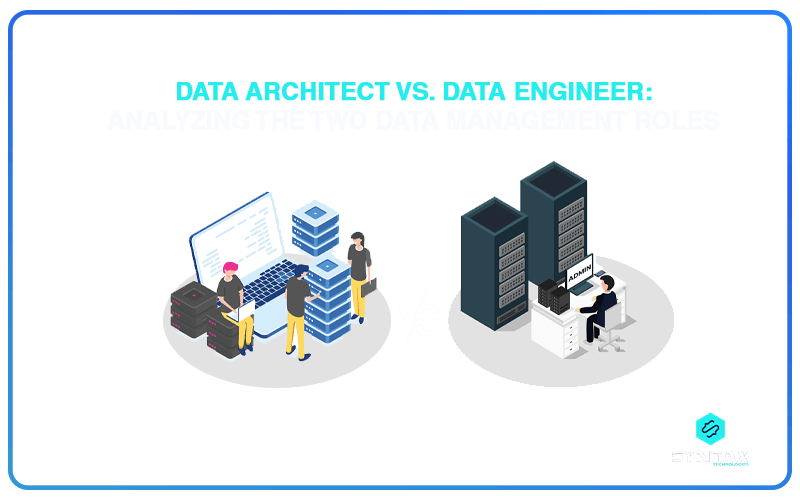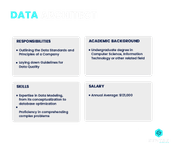Data that Sit Unused are no Different from Data that were Never collected in the First Place-Doug Fisher
The modern economy is the data economy where data is the new currency. The technological advancements which have been responsible for pushing business organizations towards a data-driven outlook, have rightly been responsible for the hype around data. Consequently, data related professions have emerged as one of the most lucrative career choices in current times.
However, this career landscape can be confusing as it covers multiple designations with overlapping roles and responsibilities. One such area which is a point of significant vagueness is that of Data Engineer vs. Data Architect.
Given the proximity of the two professions with the overall process of Data Management, the distinguishing line between a Data Architect and Data Engineer is often overlooked. However, the issue of Data Architect vs. Engineer is very much a real one and worthy of consideration.
In this blog, we shall look at the issue of Data Architect vs. Data Engineer in terms of their respective roles and responsibilities as well as career pathway. Subsequently, we shall also take up the issue of Data Architect vs. Data Engineer Salary.
Data Engineer vs. Data Architect
What is a Data Architect?
The word architect connotes a sense of building or creating something. On much the same note, a Data Architect is someone who is responsible for utilizing their skills and competencies for building databases.
They engineer the infrastructure which supports and stores data. Data Architects are the ones who help formulate the data strategy of the organization as well as concretize the data management standards and principles of the organization.
In other words, they help in outlining the data blueprint which other consumers of data within the organization have to inevitably abide by.
Roles and Responsibilities of a Data Architect
In this section, we shall look at some of the most important duties which Data Architects have to execute in their professional capacity. An elaboration of roles and responsibilities is also an important point of comparison under the topic of Data Architect vs. Data Engineer.
- Developing, designing, translating and executing the data strategy of the organization as well as business requirements.
- Overlooking policies with regard to data sources, data flow, data pipelines, data systems and overall data security.
- Defining the organizational data architecture pattern.
- Selecting data stores as per the type of data being stored, along with transforming and loading data.
- A Data Architect is responsible for the verification of data consistency as well as data access optimization.
- They actively collaborate with Data Scientists, Data Analysts, as well as Data Engineers for the efficient execution of the data strategy.
- They often spearhead teams which are responsible for developing reliable and high performance analytics software.
How to become a Data Architect?
Let us look at a rough roadmap which you can follow if you wish to be a Data Architect.
Earning an Undergraduate Degree
In the first step, you begin by acquiring an Undergraduate Degree in Computer Science, Information Technology, Computer Engineering or other related field. Additionally, as an occupational requirement, you will be required to have some kind of an academic background in application design, systems development and information management.
Acquire Relevant Skills
As a Data Architect, you are expected to nurture appropriate competencies. This would include skills related to:
- Data Visualization
- Data Mining
- Predictive Modeling
- Machine Learning
- Application Server Software
Additionally, as an aspiring Data Architect, you will be required to nurture certain soft skills like:
- Excellent Communication Skills
- Industry Knowledge
- Problem Solving Skills
- Management Skills
Aim for Professional Certifications
Aspiring Data Architects can aim for relevant certifications like:
- Certified Data Management Professional (CDMP)
- TOGAF Certification Program
- Salesforce Certified Data Architecture and Management Designer
- IBM Certified Data Architect
- Earning a Master?s Degree
Since the position of a Data Architect is a senior level position, it will be important for you to keep sharpening your skills and upgrading your qualifications. Accordingly, you can dedicate yourself to a master?s degree in Data Science, Big Data Analytics or Computer Science.
Data Engineer vs. Architect
What is a Data Engineer?
A Data Engineer is a professional engaged in data engineering. This implies that he is responsible for the design, maintenance and optimization of data infrastructure for data management, acquisition, access and transformation.
As engineers, they make use of the fundamentals of software engineering for creating algorithms which could automate the process of data flow. They harvest huge volumes of data and logically apply it to different problems.
They aid Data Architects in designing data frameworks for data search and retrieval, which then can be used by Data Analysts and Data Scientists. Data Engineers also collaborate with a Data Scientist to create analytics and machine learning infrastructure.
As such, they are responsible for transforming data into formats which is usable and analyzable by other professionals within the organization.?
Roles and Responsibilities of a Data Engineer
In this section, we shall look at some of the most important duties which Data Engineers have to execute in their professional capacity. An elaboration of roles and responsibilities is also an important point of comparison under the topic of Data Engineer vs. Data Architect.
- Designing and maintenance of data infrastructure for the acquisition, transformation and loading of data from multiple sources.
- They are responsible for data cleaning and data wrangling, in order to convert them into usable formats.
- They customize and manage analytical systems, integration tools, data warehouses and databases.
- They evaluate the system performance and closely work with the testing team as well.
- They ensure data availability at all times through stringent compliance with organizational data policies in terms of confidentiality and data privacy.
- They work in liaison with Data Architects, Data Analysts, Data Scientists and other stakeholders in order to develop a larger picture of the best means for optimally utilizing data.
How to become a Data Engineer?
Let us look at a rough roadmap which you can follow if you wish to be a Data Engineer.
Earning an Undergraduate Degree
In the first step, you begin by acquiring an Undergraduate Degree in Computer Science, Information Technology, Software Engineering, Data Science or other related field. Additionally, as an occupational requirement, you will be required to have some kind of an academic background in data architecture, computer programming, database management, or software design.
Acquire Relevant Skills
As a Data Engineer, you are expected to nurture appropriate competencies. This would include skills related to:
- Knowledge of SQL and NoSQL databases
- Understanding of Data migration and integration techniques
- Expertise in different data wrangling strategies as well as tools such as ETL
- Fluency in one or more programming languages
- Proficiency in data processing techniques like batch processing and real-time processing
- Skilled in creating data solutions using renowned cloud providers
Aim for Professional Certifications
Aspiring Data Engineers can aim for relevant certifications like:
- Certified Data Management Professional (CDMP)
- Google?s Certified Professional
- Cloudera Certified Professional (CCP)
- IBM Certified Data Architect
Data Architect vs. Data Engineer: A Comparative Study
In this section, we shall directly address the issue of Data Engineer vs. Architect.
Even after having outlined the differences between a Data Architect and that of a Data Engineer; it is important to remember that the issue of Data Architect vs. Data Engineer can be quite a confusing one. This is especially because the roles and responsibilities of both the professionals happen to revolve around data and they are concerned with different aspects of the same process of data management.
Thus, in order to develop a better understanding of the role of the two personnel, it would be better to evaluate the issue of Data Engineer vs. Data Architect in terms of the complementary and yet distinct ways in which they contribute towards organizational data management.
Data Engineer vs. Data Architect Salary
In this section, we shall evaluate the two positions of a Data Architect and that of a Data Engineer on the basis of their average salary.
The average salary for a Data Architect in the United States is $121,000 per annum. The salary range is somewhat from $78,000 per annum to as high as $179,000 per annum, on the basis of skills and experience.
The average salary for a Data Engineer in the United States is $113,000 per annum. However, this number is not universally applicable for the entire country. They differ significantly by state and even by city. For instance, in Seattle, the annual average salary for a Data Engineer can be as high as $120,000; while in New York, it can be $118,000.
While discussing the issue of Data Architect vs. Data Engineer Salary, it is evident that Data Architects happen to earn more as compared to Data Engineers. This is also due to the fact that Data Architects occupy senior level positions in the data personnel ladder.
Conclusion
Both the designations of a Data Architect as well as that of a Data Engineer, occupy highly esteemed positions within the Data Management domain. Their roles and responsibilities are considerably overlapping, which often results in overlooking the issue of Data Architect vs. Data Engineer.
However, on a closer analysis, one would understand that there are substantial technical distinctions between the two professional roles, as elucidated in the blog above. This implies that the issue of Data Engineer vs. Data Architect is certainly a real one.
Data professionals happen to occupy a coveted position within the job landscape. Aspiring candidates can hope of a lucrative inauguration of their career as Data Architects or Data Engineers.
We, at Syntax Technologies, provide you with the amazing opportunity of developing expertise in one of the most renowned career choices within the data domain and that is of a Data Analyst. Enroll now for our Data Analytics course.





